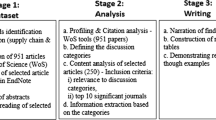Abstract
This article examines whether the involvement of stakeholders in the design of corporate codes of conduct leads to a higher implementation likelihood of the code. The empirical focus is on Occupational Safety and Health (OSH). The article compares the inclusion of OSH issues in the codes of conduct of 30 companies involved in International Framework Agreements (IFAs), agreed upon by trade unions and multinational enterprises, with those of a benchmark sample of 38 leading Multinational Enterprises in comparable industries. It is found that codes of the IFA group have a higher implementation likelihood in OSH than the codes of the benchmark group. Further, European firms, culturally more used to stakeholder involvement, score higher than their US and Japanese competitors, and hence are more capable of addressing the safety and health issues in international supply chains. The implementation likelihood of codes seems closely related to the type of corporate CSR approach.
Similar content being viewed by others
Abbreviations
- CSR:
-
Corporate Social Responsibility
- ICFTU:
-
International Confederation of Free Trade Unions
- IFA:
-
International Framework Agreement
- ILO:
-
International Labour Organization
- MNE:
-
Multinational Enterprise
- NGO:
-
Non-Governmental Organization
- OSH:
-
Occupational Health and Safety
- WHO:
-
World Health Organization
References
Adams J. S., A. Tschian, T. Shore 2001, Codes of Ethics as Signals for Ethical Behaviour. Journal of Business Ethics 29(3), 199–211
Andriof J., M. McIntosh (eds): 2001, Perspectives on Corporate Citizenship (Greenleaf Publishing, Sheffield)
Bruins, D.: 2006, Transnational Corporations and Occupational Safety and Health, MA thesis, Rotterdam
Carasco E., J. Singh 2003, The Content and Focus of the Codes of Ethics of the World’s Largest Transnational Corporations. Business and Society Review 108(1), 71–94
Carroll A. 1979, A Three Dimensional Conceptual Model of Corporate Performance. Academy of Management Review 4, 497–505
Carter C. 2000, Ethical Issues in International Buyer–Supplier Relationships: A Dyadic Examination. Journal of Operations Management 18(2), 191–208
Carter C., M. Jennings 2002, Social Responsibility and Supply Chain Relationships. Transportation Research Part E 38, 37–52
Donaldson T., T. Dunfee: 1999, Ties that Bind: A Social Contract Approach to Business Ethics (Harvard Business School Press, Boston)
Emmelhainz M. A., R. Adams 1999, The Apparel Industry Response to “Sweatshop” Concerns: A Review and Analysis of Codes of Conduct. Journal of Supply Chain Management 35(3), 51–57
Habermas J. 1990, Moral Consciousness and Communicative Action (MIT Press, Cambridge, MA)
International Labor Organization: 2005, Decent Work – Safe Work. Orlando
Kaptein M. 2004, Business Codes of Multinational Firms: What do they Say? Journal of Business Ethics 50(1), 13–31
Kaptein M., J. Wempe: 2002, The Balanced Company. A Theory of Corporate Integrity (Oxford University Press, New York)
Kolk A., R. van Tulder 2002, Child Labor and Multinational Conduct: A Comparison of International Business and Stakeholder Codes. Journal of Business Ethics 36, 291–301
Kolk A., R. van Tulder 2005, Setting New Global Rules? TNCs and Codes of Conduct. Transnational Corporations 14(3), 1–17
Kostova T., S. Zaheer 1999, Organizational Legitimacy Under Conditions of Complexity: The Case of the Multinational Enterprise. Academy of Management Review 24(1), 64–81
Maignan I., D. Ralston 2002, Corporate Social Responsibility in Europe and the US. Journal of International Business Studies 33(3), 497–514
Maloni M., M. Brown 2006, Corporate Social Responsibility in the Supply Chain: An Application in the Food Industry. Journal of Business Ethics 68, 35–52
Mamic I. 2005, Managing Global Supply Chains: The Sports, Footwear, Apparel and Retail Sectors. Journal of Business Ethics 59, 81–100
Michaelson C. 2006, Compliance and the Illusion of Ethical Progress. Journal of Business Ethics 66, 241–251
North D. 1991, Institutions. Journal of Economic Perspectives 5, 97–112
Phillips R., C. Caldwell 2005, Value Chain Responsibility: A Farewell to Arm’s Length. Business and Society Review 110(4), 345–370
Post J. 1979, The Corporation in the Public Policy Process – a View Towards the 1980s. Sloan Management Review 21, 45–52
Post, J., A. Lawrence and J. Weber.: 2002, Business and Society (McGraw Hill, Boston, MA)
Preuss L. 2001, In Dirty Chains? Purchasing and Greener Manufacturing. Journal of Business Ethics 34, 345–359
Roberts S. 2003, Supply Chain Specific? Understanding the Patchy Success of Ethical Sourcing Initiatives. Journal of Business Ethics 33, 159–170
Singh J. B. 2006, A Comparison of the Contents of the Codes of Ethics of Canada’s Largest Corporations in 1992 and 2003. Journal of Business Ethics 64(1), 17–29
Snir E. 2001, Liability as a Catalyst for Product Stewardship. Production and Operations Management Society 10(2), 190–206
Sobczak A. 2006, Are Codes of Conduct in Global Supply Chains Really Voluntary? From Soft Law Regulation of Labour Relations to Consumer Law. Business Ethics Quarterly 16(2), 167–184
Swanson D. 1995, Addressing a Theoretical Problem by Reorienting the Corporate Social Performance Model. Academy of Management Review 20(1), 43–64
Van Tulder R., A. Kolk 2001, Multinationality and Corporate Ethics: Codes of Conduct in the Sporting Goods Industry. Journal of International Business Studies 32(2), 267–283
Van Tulder, R. with A. van der Zwart: 2006, International Business-Society Management: Linking Corporate Responsibility and Globalisation (Routledge, London)
Wartick S., P. Cochran 1985, The Evolution of the Corporate Social Performance Model. Academy of Management Review 10(4), 758–769
Wood D. 1991, Corporate Social Performance Revisited. Academy of Management Review 16(4), 691–718
Acknowledgement
The authors would like to thank Dolf Bruins for data collection and research assistance.
Author information
Authors and Affiliations
Corresponding author
Rights and permissions
About this article
Cite this article
van Tulder, R., van Wijk, J. & Kolk, A. From Chain Liability to Chain Responsibility. J Bus Ethics 85 (Suppl 2), 399–412 (2009). https://doi.org/10.1007/s10551-008-9742-z
Published:
Issue Date:
DOI: https://doi.org/10.1007/s10551-008-9742-z




